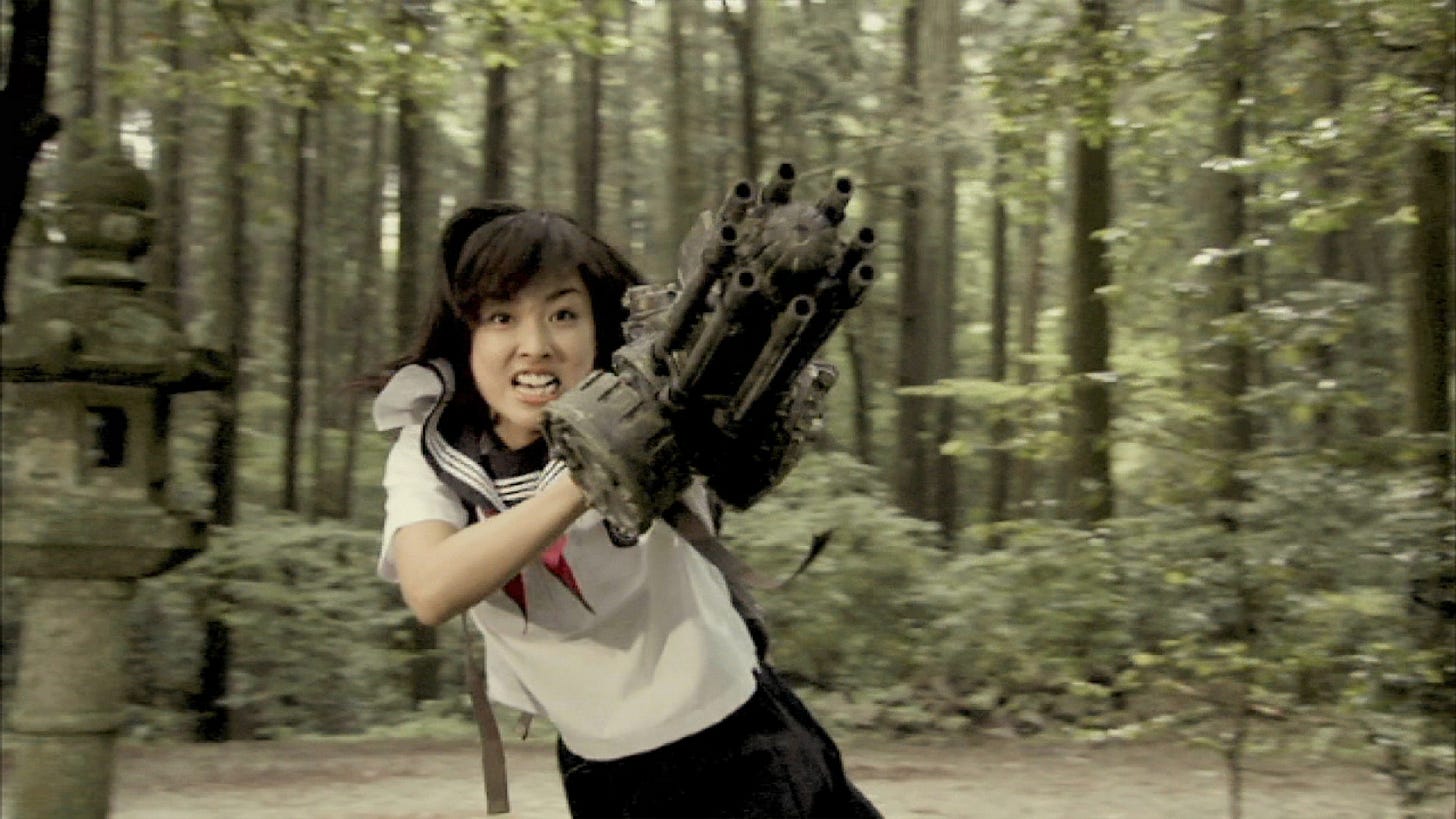Rooting for the Arm to Come Off
Machine Girl and the joys of pulp and revenge
Noboru Iguchi’s Machine Girl (2008) includes limbs lopped off, giant holes torn through unsuspecting torsos, and (not to be forgotten) a severed head in soup. Also, gazillions of gushing geysers of arterial spray. Blood in this film is not so much a part of bodies as a prisoner of them…a prisoner that longs to spurt free!
There is a plot; schoolgirl Ami (Minase Yashiro) loses her brother and her arm to the local Yakuza bully Sho Kimura. Ami seeks revenge with the help of Suguru and Miki Sugihara, garage mechanics who fit Ami with a prosthetic machine gun. Hijinks ensue.
What’s most remarkable, and most exhilarating, about the narrative, is the extent to which it’s gratuitously gratuitous. It’s almost like the Naked Gun movies, but with decapitations replacing the stupid gags. The story is clearly just there to provide an (often feeble) excuse for the gore. The first scene begins in media res — and you never do really figure out where it fits in chronology. Why should you? Where it fits in chronology doesn’t matter; the only reason it’s there is to start the film off with a wet, meaty thunk. Similarly, there’s a ridiculous scene where Ami goes to meet the parents of one of the boys who was bullying her brother…and the nice domestic couple suddenly and improbably come after her like rabid ninjas. Continuity, characterization — who cares? We’re all about the body fluids and the spinning drill bras.
Machine Girl is unusually blatant…but that very blatancy starts to raise questions about the unusualness. If Machine Girl is dedicated to the set-piece pay off, does that actually distinguish it from other genre fare?
As one example, Machine Girl has some superhero genre elements. Even if her superpower is predictably rudimentary (she has a machine gun on her severed arm) it still function as a superpower: a distinguishable, cool gimmick that gives her her name (“Machine Girl!”) and makes her tougher than the average baddie.
Moreoever, like all superpowers, hers has to be explained. We learn early on in the teaser sequence that she’s lost her arm and gained a gun, but we don’t know how. We need an origin…and the film gleefully and cynically plays with that need. Ami’s arm keeps getting mauled — first it’s dunked in boiling water, then it’s stabbed with a sword…and then finally, with much fanfare, it’s hacked off. Each time the arm is hurt, the viewer is leaning forward, wondering, is this the moment?! You’re essentially rooting for that arm to come off so Ami can look like the promo picture and start doing some serious killing.
And that is how origins work, I think. There’s a narrative pretense that you care about, say, young Matt Murdock and want him to prevail — but as the origin story is told and retold and re-retold, there’s also clearly a sense in which you’re eagerly anticipating the moment when he gets blinded…or when Bruce Wayne’s parents get shot, or Uncle Ben gets his. If you didn’t want to see some trauma, you’d be reading some other genre.
There’s a similar dynamic at work with Machine Girl’s revenge plot. Revenge is not so much a blow for justice as it is an excuse for limitless violence. The film even engages in something like deliberate self-parody in its second half, where the parents of several of the victims of Ami’s revenge swear revenge themselves. “We can turn into demons for our children too!” they exclaim. The more revenge the merrier — particularly for those of us in the cheap seats.
Before the action of the film began, we learn, Ami’s parents were falsely accused of murder and committed suicide. Because of her heritage, Ami is herself accused of being a murderer…an identity she at first rejects but then is, of course, forced to embrace. It’s a neat metaphor for pulp; some distant violence hangs overhead, anticipated but disavowed, until the mechanisms of plot and genre simultaneously actualize and excuse it. The Joker kills everybody in this room so that we can watch Batman beat the stuffing out of him; somebody (everybody!) abuses Bruce Banner so he can get big and green and smash stuff.
When we read superhero comics or watch a revenge narrative, we’re supposed to pretend that we’re looking for redress or justice…but as in Machine Girl, wasn’t the murderer always already there? The arm always will have been torn off before you start; the reason comes afterwards as an excuse, not a rationale. Ami knows for sure what Peter Parker is too coy to let on; with great power comes great gouts of violence.
—
This ran in Splice Today years ago; I just stumbled on it again and figured I’d reshare.



It seems like a live-action anime film; there's a lot of strange stuff going on there...